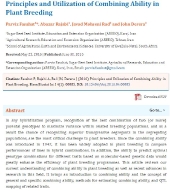gobeaguru wrote:
are you talking about moving the domestication genes from crop plants to novel wild plants?
Not sure if that was directed at me, but no, I am for simply using more wild plants, more semi-domesticated ones, more heirlooms and traditional crops. Over time, some of these will likely become more domesticated, but primarily by selection of desirable traits.
I don't remember the exact statistic - something like 50% of humanity's nutrition comes from 4 plants (corn, rice, wheat, soy), or something like 70% comes from 10 plants, or whatever the exact numbers were. I think it is too narrow a base. I think that the answer is to grow and eat more variety.
As far as hybridization, I am most excited about some of the hazelnut crosses that are being developed ... the goal is a shrub hazelnut that is resistant to disease, an efficient, high-yield perennial that requires little inputs. These hybrids are not across such a big genetic divide as the corn x oats cross, but it would result in in a more diversified food supply as hazelnuts currently provide little of our total diet, but might provide a modestly bigger share and take some of the burden off of corn/wheat/soy.





